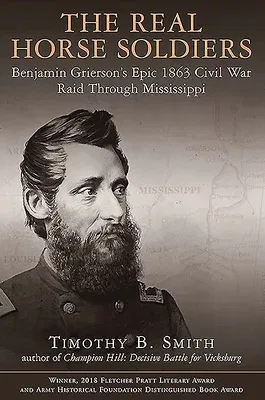**Winner, 2018, Operational / Battle History, Army Historical Foundation
Distinguished Book Award
Winner, 2018, Fletcher Pratt Literary Award, Civil War Round Table of
New York
**
Benjamin Grierson's Union cavalry thrust through Mississippi is one of
the most well-known operations of the Civil War. The last serious study
was published more than six decades ago. Since then other accounts have
appeared, but none are deeply researched full-length studies of the raid
and its more than substantial (and yet often overlooked) results. The
publication of Timothy B. Smith's The Real Horse Soldiers: Benjamin
Grierson's Epic 1863 Civil War Raid through Mississippi rectifies this
oversight.
There were other simultaneous operations to distract Confederate
attention from the real threat posed by U. S. Grant's Army of the
Tennessee. Grierson's operation, however, mainly conducted with two
Illinois cavalry regiments, has become the most famous, and for good
reason: For 16 days (April 17 to May 2) Grierson led Confederate
pursuers on a high-stakes chase through the entire state of Mississippi,
entering the northern border with Tennessee and exiting its southern
border with Louisiana. The daily rides were long, the rest stops short,
and the tension high. Ironically, the man who led the raid was a former
music teacher who some say disliked horses. Throughout, he displayed
outstanding leadership and cunning, destroyed railroad tracks, burned
trestles and bridges, freed slaves, and created as much damage and chaos
as possible.
Grierson's Raid broke a vital Confederate rail line at Newton Station
that supplied Vicksburg and, perhaps most importantly, consumed the
attention of the Confederate high command. While Confederate Lt. Gen.
John Pemberton at Vicksburg and other Southern leaders looked in the
wrong directions, Grant moved his entire Army of the Tennessee across
the Mississippi River below Vicksburg, spelling the doom of that city,
the Confederate chances of holding the river, and perhaps the
Confederacy itself.
Novelists have attempted to capture the large-than-life cavalry raid in
the popular imagination, and Hollywood reproduced the daring cavalry
action in The Horse Soldiers, a 1959 major motion picture starring John
Wayne and William Holden. Although the film replicates the raid's drama
and high-stakes gamble, cinematic license chipped away at its
accuracy.
Based upon years of research and presented in gripping, fast-paced
prose, Timothy B. Smith's The Real Horse Soldiers captures the high
drama and tension of the 1863 horse soldiers in a modern, comprehensive,
academic study. Readers will find it fills a wide void in Civil War
literature.

